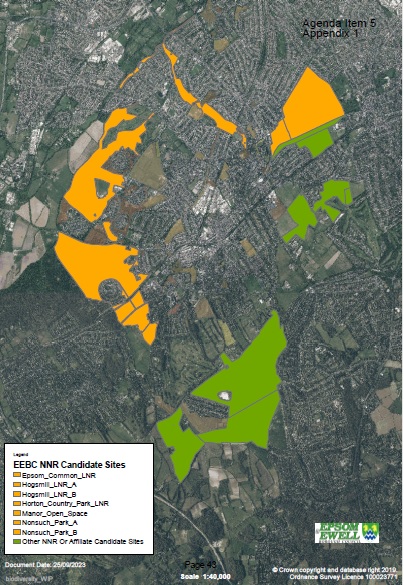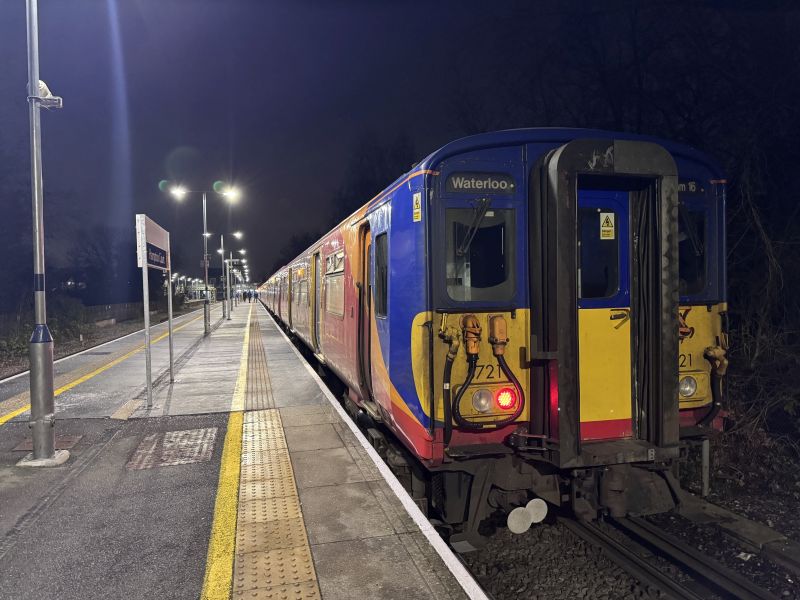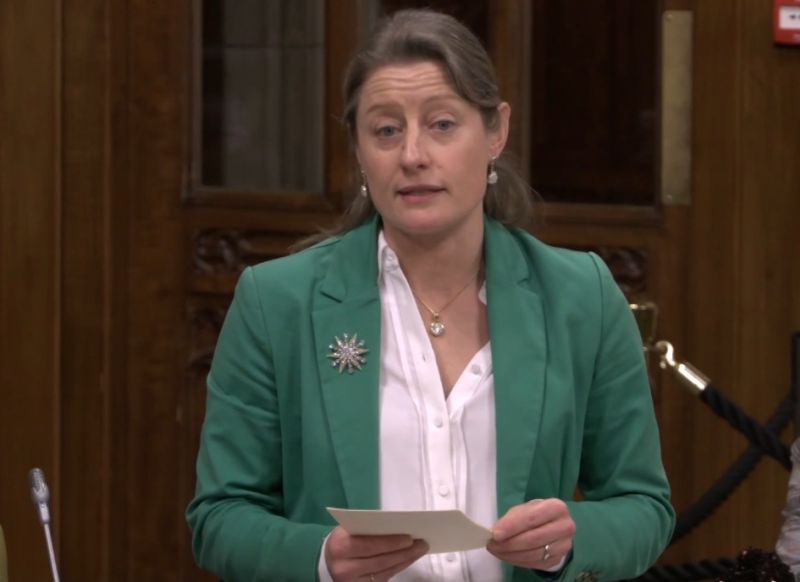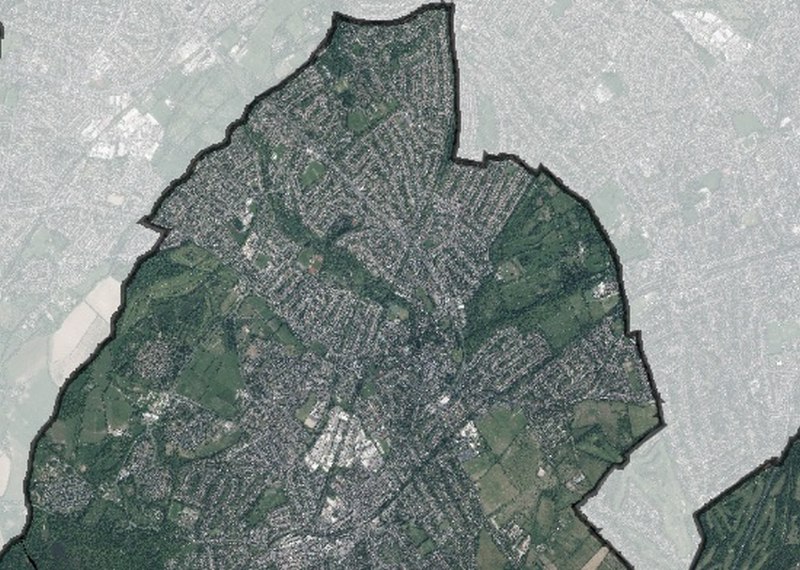No reservations to put reserves in “Thames to Downs”
Epsom & Ewell Council Eyes Inclusion of Local Natural reserves in the ‘Thames To Downs’ National Nature Reserve.
The Council’s Environment Committee 17th October debated an ambitious move to preserve its natural heritage and enhance biodiversity. The Council is considering the inclusion of several of its green spaces within the proposed ‘Thames To Downs National Nature Reserve’ (NNR). The council plans to report back to the committee if Natural England deems them suitable for this scheme.
The recommendation comes as a bid to consolidate and expand upon the Council’s ongoing efforts in managing biodiversity and public access within its open spaces. The move also carries the potential for national recognition, designating the council as an ‘Approved Body’ known for maintaining its land to the highest environmental standards on a permanent basis.

The NNR management criteria align with the council’s strategy of balancing biodiversity conservation with ensuring public access to these natural sanctuaries. Collaborating as part of the NNR partnership with neighboring landowners is anticipated to attract substantial external funding to aid in long-term land preservation and management.
Furthermore, inclusion in the NNR not only fulfills key service priorities but also demonstrates the council’s commitment to its statutory responsibilities. It aligns seamlessly with the ‘Biodiversity Duty’ and other environmental requirements, such as upcoming Local Nature Recovery Strategies.
The NNR status will not only showcase the borough as an exceptional place to live and work but also contribute significantly to preserving and expanding local biodiversity.
Epsom Common Local Nature Reserve (LNR), a site of national importance for nature, gained recognition as a Site of Special Scientific Interest (SSSI) alongside Ashtead Common back in 1955. In the 2005-2015 Epsom Common Management Plan, the council committed to achieving a ‘Favorable’ SSSI condition assessment for Epsom Common. Subsequently, the goal was to apply for National Nature Reserve status, encompassing the entirety of the Epsom & Ashtead Commons SSSI as part of a National Nature Reserve.
The endeavor to secure NNR status for Epsom Common LNR is well-documented in the council’s current Epsom Common LNR Management Plan 2016-2116 and the Climate Change Action Plan.
An officer explained to the committee: “We are really keen that Epsom Common joins Ashtead Common in being declared a National Nature Reserve. We’ve all been set up for that for over a decade. It’s in the management plan; it’s Council policy to do that. But Natural England has changed its approach to National Nature Reserves in the last two or three years. They have put forward the offer to work with us and other partners to form a much larger, what they would term a super-national Nature Reserve, going from the Thames at Kingston to the North Downs.”
Cllr Julie Morris (LibDem College) raised the question what legal status such a NNR would have? Could landowners within them nevertheless develop their land? The officer answered: “Epsom Common, for example, is a Site of Special Scientific Interest, and that’s the strongest legal protection that you can afford a site like that. The other sites that are being put forward are in the Green Belt. They are sites of nature conservation importance. They have ancient woodlands. All of those are material considerations for a planning application. Alistair Helwell, who is the lead person at Natural England for National Nature Reserves, does make a point of saying it is a declaration, not a designation. So it doesn’t afford greater protection, but it does afford a greater level of kudos, obviously”
National Nature Reserves (NNRs) are vital for preserving significant habitats, species, and geology while serving as invaluable ‘outdoor laboratories’ for research. These reserves offer opportunities for schools, special interest groups, and the general public to directly experience wildlife and learn more about nature conservation.
Currently, England boasts 221 NNRs covering over 105,000 hectares of land, approximately 0.7% of the country’s surface. The largest among them is The Wash, sprawling over almost 8,800 hectares, while Dorset’s Horn Park Quarry is the smallest at 0.32 hectares. The five proposed sites in Epsom & Ewell together span an impressive 455 hectares, equivalent to 13.4% of the borough’s land.
A ‘Favorable’ SSSI condition assessment was successfully attained in 2010, prompting the council to commence the NNR application process. Unfortunately, due to funding cuts at Natural England, the application was postponed for nearly a decade. It was only in 2021 that the council was approached once again by Natural England, offering renewed prospects for an NNR application. In 2022, Natural England’s approach evolved, emphasizing the creation of more extensive landscape-scale NNRs in line with the government’s ‘Making Space For Nature’ initiative.
The council has been invited to put forward other sites under its ownership/management for possible inclusion in a landscape-scale NNR stretching from the Thames at Kingston to Box Hill on the North Downs.
Five potential sites in Epsom & Ewell, including Epsom Common Local Nature Reserve (LNR), Manor Open Space, Horton Country Park LNR, Hogsmill LNR, and Nonsuch Park, have been identified. Natural England has suggested an affiliate status for sites primarily designated for purposes other than nature conservation, such as Epsom Downs. It’s important to note that the inclusion of Nonsuch Park will require separate permission from the Nonsuch Park Joint Management Committee.
A comprehensive partnership with a variety of landowners is envisioned, including local authorities, Surrey Wildlife Trust, National Trust, Woodland Trust, Crown Estates, Merton College (Oxford), and City of London (Ashtead Common).
The unanimous decision of the committee to include the named sites within Epsom & Ewell for consideration will be followed by assessments of their suitability and the council’s capability as an ‘Approved Body’ for managing an NNR.




















